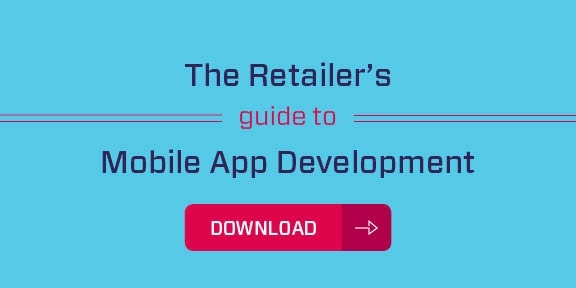- 94% of smartphone users search for location based information
- 51% of those visited a store
- 48% of those called a store
- 29% of those made a purchase in-store and did so quickly
Most people are aware of the important role mobile plays in marketing. 1/3 of all web traffic is from mobile devices. This creates a huge opportunity for retailers to implement a quality mobile strategy and capitalize on the 80% of internet users own a smartphone.
82% of smartphone users utilize their phone to get information about a purchase they are considering. So that you can get an idea of the financial impact that 82% has on spending, according to Deloitte, 64 cents of every dollar spent in retail stores is influenced by digital.
When developing a mobile strategy, many businesses wonder if they should develop a mobile website or a mobile app. The answer is often both. Mobile websites and mobile apps cater to different customers with different needs. An app can serve as a bookmark for the needs of loyal, regular customers. A mobile site is for other customers, whether they are a casual browser or an semi-regular online shopper.
What does it take to build a successful ecommerce app? All too often, apps have low retention rates because they are not well planned. On average, mobile apps lose 77% of their daily average users within the first three days after download. After 30 days that number jumps up to 90%. Most people cite functionality as the main reason they stop using an app.
So how can you keep people engaging with your mobile app? Map out your customer's needs and how your app can address one or more of them. Here are the keys to a successful mobile app.
Utility
Will your mobile app provide some sort of functionality that makes your customers' lives easier or a task more enjoyable? This can come in many forms. One example is the Starbucks app that allows you to pay with their mobile app and track your rewards points. Another example might be providing access to frequently sought after information such as movie times. These are things that would otherwise require more steps taken or effort on the customer's part that your app has now made much easier.
Value
There are certain situations where you can create value for your customers through an app, whether it is saving time or money. For example, some customers like to hunt for sales or coupons prior to shopping. A mobile app that brings what they seek directly to them saves them both time and money. You can also reward customers for continually using your app by creating a rewards program available only to the app users.
Entertainment
This one isn't directly related to ecommerce, but it's worth talking about. Some of the most popular mobile apps come in the form of games or entertainment (think Words With Friends or Pokemon Go). Doing so gives users content that interests and engages them. This form of mobile app is very valuable because it can have a very high retention and engagement rate, but it is also a challenging format because the users are constantly expecting new content. If you do not meet expectations continuously, you'll find your mobile app deleted.
Experience
One of the most undervalued aspects in today's marketplace is brand experience. Many consumers expect a unique and pleasant experience that enhances their shopping experience. In fact, many consumers now place experience at the top of their list over products. Understanding your customer base, what they value, how you can improve their engagement, and how they shop can take you from brand to brand loyalty.
As long as your app falls in one of these categories, then you have a case for building a quality mobile app. Mobile apps do not have to be expensive and you can always add to your app's functionality over time. But you do want to launch with the core functionality as fine-tined as possible. Doing so will give users a reason to make the download and retain the mobile app on their device.
The best case study is one of our own for a regional retailer where we were able to achieve 468% ROI within ten months. We were able to keep the project lean while generating value for both the user and our client. You can use this case study as a road map for your own successful mobile app as well as the checklist below to plan your app.


